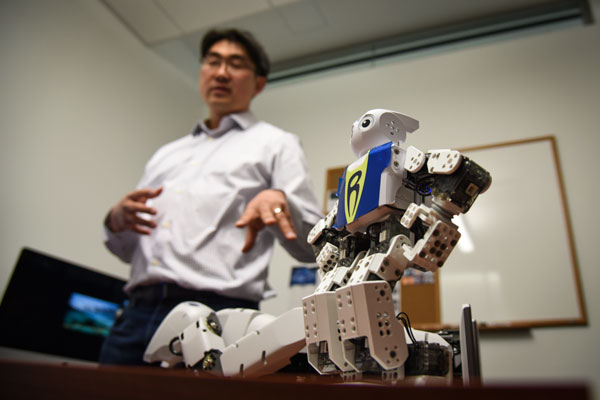A researcher and his soccer-playing robot are scoring big.
Chung Hyuk Park, an assistant professor of biomedical engineering, is building robots to help autistic children improve their social interactions – making them more comfortable interacting and communicating through the robots. Park said he will start presenting the robots at conferences this year and hopes that the robots will eventually be affordable enough for all children with autism.
Park said he came up with the idea when he worked with visually impaired people and disabled children. He said working with children encouraged him to pursue assistive robotics and develop specific robots to help children with autism “learn new things, make friends, pursue happiness and take meaningful steps in their lives.”
“Robotics may not be the cure, but it can help them to practice their social skills, to engage in emotional and social activities and to help them gain more confidence in their human interactions,” Park said.
Park has programmed two large robots, three medium robots and three robots that connect to iPhones. The larger robots play soccer and speak, the medium robots dance and the iPhone-capable robots display emotion by turning an iPhone screen into the robots’ faces.
“We tried to combine musical interaction and robot interaction for children with autism to better promote engagement and social interaction,” Park said.
He said he hopes to progress the most effective ways for the robots to engage with children and that children will feel comfortable interacting with the robots, helping them to develop social skills and to communicate their problems.
“They might have some specific behaviors, and if the robot can learn those behaviors and mimic them in a friendly way, then the robot can develop a better rapport with the children,” Park said. “And they can be friends and be more effective in engaging with them.”
Park received a $690,000 three-year grant in 2014 from the National Institute of Health for the project. He said a master’s student and three undergraduate students have helped with the research.
Park said he has studied children without autism with the robots and is now recruiting children with autism to interact with the robots. He said his team hopes to study 100 children on the autism spectrum interacting with the robots.
Park said there are other robot models, specifically in Europe, that were later turned into toys. He said his goal is to make an affordable robot specifically for children with autism.
“We wanted to provide a more skillful but less costly framework that could be purchased in the future,” Park said.
He said he can analyze the children’s progress on social and emotional engagement through their interactions with the robots and use music in the background to analyze the sound effect on children through vocal reaction.
Park said he will measure the children’s daily progress to provide more quantifiable data to clinicians and parents on how the robots impact the children’s abilities.
“We cannot measure emotion directly, but they are kids, so we can ask their parents to report progress in their emotional changes,” Park said. “We can use a microphone to analyze sound and translate vocal reaction.”







